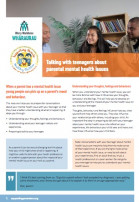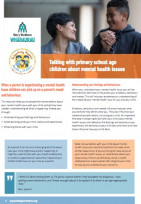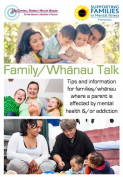1. Be informed
Research and learn as much as you can about your parent’s mental health condition. This will help you understand their behaviour. What is their condition? What are the symptoms? How can their condition be treated? Talk to other people who have gone through the same experience – they might be able to offer advice and support and make you feel less alone.
2. Be supportive
If possible, let your parent know you are there to support them. Offer to help them with things they might need. Let them know you’re there to listen and to talk to. As well as emotional support, they may need help with practical things like getting to appointments, shopping or cleaning the house.
3. Make sure you’re supported
Having a parent with mental distress can be emotionally and mentally exhausting so it’s important to make sure you’re looking after yourself. Take time out for yourself and don’t bottle up your feelings. Make sure you have someone to talk to about what you’re going through and the challenges you’re facing. Ensure other family members know what’s going on so they can help too.
4. Dealing with stigma and discrimination
Unfortunately, there’s still a lot of stigma around mental illness despite 1 in 5 New Zealanders experiencing a mental health problem each year. You may feel embarrassed or ashamed about your parent’s condition or you may have friends or family who don’t understand mental distress. Keeping yourself and your friends and family informed about mental distress can help reduce stigma and discrimination.
5. Seek professional help
If you are dealing with a parent with a mental health condition or if you had a difficult childhood growing up with that parent, you may feel you need professional help. That’s ok, just reach out! There are lots of organisations that offer support and advice.
It’s also quite common for children of parents with mental problems to worry that they have a mental health condition like their parent, and there is also support for them.
The Mental Health Foundation has a free resource and information service that will point you in the right direction.
6. Get support
- The Mental Health Foundation has a comprehensive list of mental health support services.
- Yellow Brick Road– an organisation dedicated to helping families living with mental health conditions.
- Free call or text 1737 to speak to or text with a trained counsellor.
- Depression Helpline (0800 111 757)
- Lifeline (0800 543 354)
- Samaritans (0800 726 666)
- Youthline (0800 376 633).









